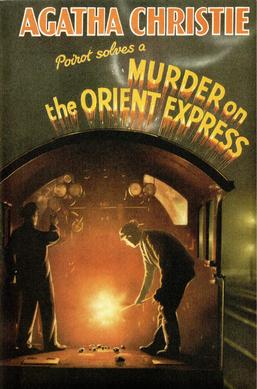Crime Review
We are on a grand, beautiful train, taking a journey from Istanbul to Paris, enjoying beautiful scenery and lavish dinners on a beautifully crafted train car. Our companions are a randomly thrown together lot: a doctor, a governess, a Russian princess and her German maid, an elderly American woman, a Swedish missionary, an American businessman who is travelling with his assistant and his valet, a Count and Countess, a chatty Italian, a salesman, an English colonel and the conductor.
But of course, there is another guest on this train, one who is returning home to London, and whose deductive skills are known all across the world. Hercule Poirot. In a style befitting Murder, She Wrote, Poirot is accidentally thrown straight into the middle of a sad, strange conspiracy when one of the trains occupants is murdered during the night. With the train stuck in a snow back and a murderer on the train, Poirot must use his famous little grey cells in order to get to the bottom of the mystery.
The best stories always use an ordinary situation and ordinary people and create something spectacular out of it. That is what Christie has accomplished here. The confined setting of a train and the suffocating number of people in the supporting cast highlights the tension in an already tense situation. This tightness forces Poirot to assess the clues that are directly in front of him, without relying on outside sources, police, mailmen, suspicious phone calls and the like to try and solve the puzzle. This makes Poirot’s conclusions seem all the more clever.
The murder itself is almost the perfect murder in more ways than its execution. It is a crime in which the reader can fully immerse themselves in, searching for clues, constantly wondering, lost in the story, without truly being able to guess with complete satisfaction until the story has reached it’s end. It is a clever book, with a clever twist.
It may be a problematic book for younger readers who may not appreciate the softness and simplicity of Christies elegantly crafted and very British world. There have been criticisms in the past of her talent as a crime writer, particularly in comparison to other, more hard boiled writers like Raymond Chandler. Other readers may find themselves rolling their eyes at how Poirot finally concluded who killed the passenger, relying on overheard moments and body language rather than actual clues. Where there is no evidence, there are alibi’s and tainted clues, a confession from a guilty party seems unbelievable, especially in a more modern society where silence is golden and you are innocent unless proven guilty.
It’s a good book. It’s one that you can return to time and time again and still find yourself enthralled with the characters and the setting and the cleverness of Christie’s writing. It’s just not for everyone.









